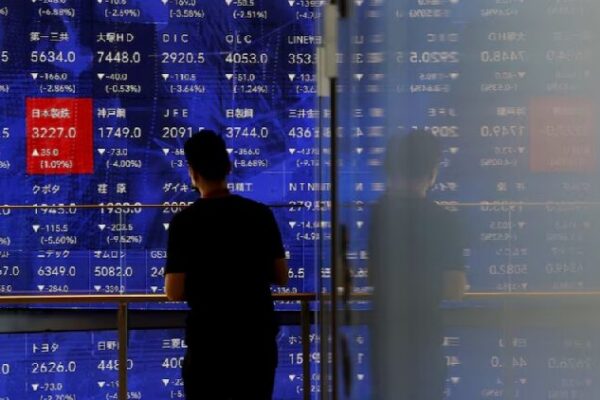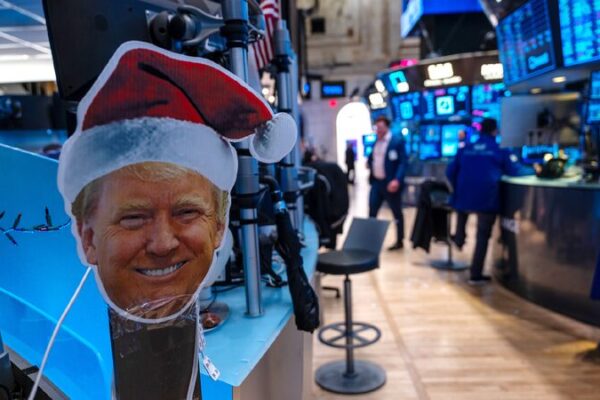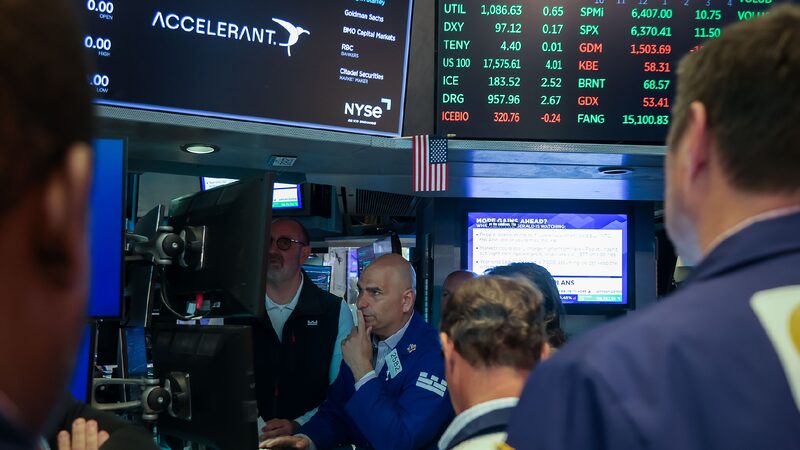Global markets took a steep dive on Thursday after U.S. President Donald Trump announced significant tariff increases on global imports, stoking fears of a potential global recession.
Shares across Europe and Asia, as well as U.S. futures, tumbled in reaction to the unexpected tariff hikes. The double-digit increases have rattled investors worldwide, triggering sharp declines in major stock indices.
Futures for the S&P 500 dropped 3.1%, while the Dow Jones Industrial Average futures fell 2.6%, signaling potential losses when U.S. markets reopen.
European Markets Slide
In Europe, Germany’s DAX slipped 1.7% to 21,998.48, France’s CAC 40 lost 1.8% to 7,716.66, and Britain’s FTSE 100 declined 1.2% to 8,506.44. The announcement led to widespread sell-offs across various sectors, with investors seeking safer assets amid the uncertainty.
Asian Markets Hit Hard
Asian markets were notably affected. Tokyo’s Nikkei 225 index briefly dipped 4% before closing 2.8% lower at 34,735.93. Major Japanese companies suffered significant losses, including Mitsubishi UFJ Financial Group, whose shares plunged 7.2%. Mizuho Financial Group skidded 8%, Sony Corp. sank 4.8%, and Toyota Motor Corp. gave up 5.2%.
The Japanese yen strengthened, with the U.S. dollar falling to 147.42 yen from 149.28 yen. The euro rose to $1.0952 from $1.0855.
South Korea, which was hit with a 25% tariff, saw its benchmark Kospi fall 1.1% to 2,486.70. In Hong Kong, the Hang Seng lost 1.7% to 22,813.22, while the Shanghai Composite Index edged 0.2% lower to 3,342.01.
The announcement came as a major shock to global investors. “The Chinese mainland, in particular, was hit with an additional 34% tariff, bringing its total tariff burden to 64% when accounting for previous measures,” said Yeap Jun Rong of IG Singapore in a commentary. However, losses were partly mitigated by expectations of further economic stimulus from Beijing to offset the impact of the higher tariffs.
Economic Concerns Grow
In Australia, the S&P/ASX 200 fell 0.9% to 7,859.70. Bangkok’s SET shed 1.1% after Thailand was assigned a 36% tariff on its exports to the U.S., which could cause Thai exports to fall by $7 billion to $8 billion, according to Kasem Prunratanamala of CGS International.
Vietnam faced a significant blow as the U.S. imposed tariffs as high as 46% on its imports. The U.S. is Vietnam’s second-largest trading partner and largest export market. The country’s stock market plummeted, with the Ho Chi Minh Index closing down by 6.7%, marking the largest single-day drop since 2001.
On Wednesday, U.S. stocks experienced a volatile session prior to Trump’s unveiling of his “Liberation Day” tariffs. The S&P 500 rose 0.7% to 5,670.97 after fluctuating between losses and gains. The Dow Jones Industrial Average added 0.6% to 42,225.32, while the Nasdaq Composite climbed 0.9% to 17,601.05.
Bond markets mirrored the uncertainty, with 10-year Treasury yields fluctuating from a morning low of 4.11% to a later rise at 4.18%, reflecting shifting expectations on economic growth and inflation. Oil prices also declined, with U.S. benchmark crude falling $2.63 to $69.08 per barrel, while Brent crude dropped $2.62 to $72.33 per barrel.
Global Trade Tensions Rise
Trump’s announcement has heightened global trade tensions. While the president argues that the tariffs will create a fairer global system and bring manufacturing jobs back to the U.S., economists warn they could slow growth, hurt global economies, and exacerbate inflation, which remains above the Federal Reserve’s 2% target.
The new tariffs include a 10% baseline tax on all imports, with steeper tariffs targeting countries with trade surpluses with the U.S. Trump displayed a chart outlining a 34% tariff on imports from the Chinese mainland and a 20% tariff on goods from the European Union.
Previously, the administration had imposed 25% tariffs on auto imports and levies on goods from the Chinese mainland, Canada, and Mexico, while expanding tariffs on steel and aluminum. Import taxes on oil from Venezuela have been introduced, and there are plans for similar measures on pharmaceutical drugs, lumber, copper, and computer chips.
The escalating trade war has left global markets on edge, with investors closely watching for further developments that could impact economic stability worldwide.
Reference(s):
Global markets rattle as Trump escalates trade war with new tariffs
cgtn.com








